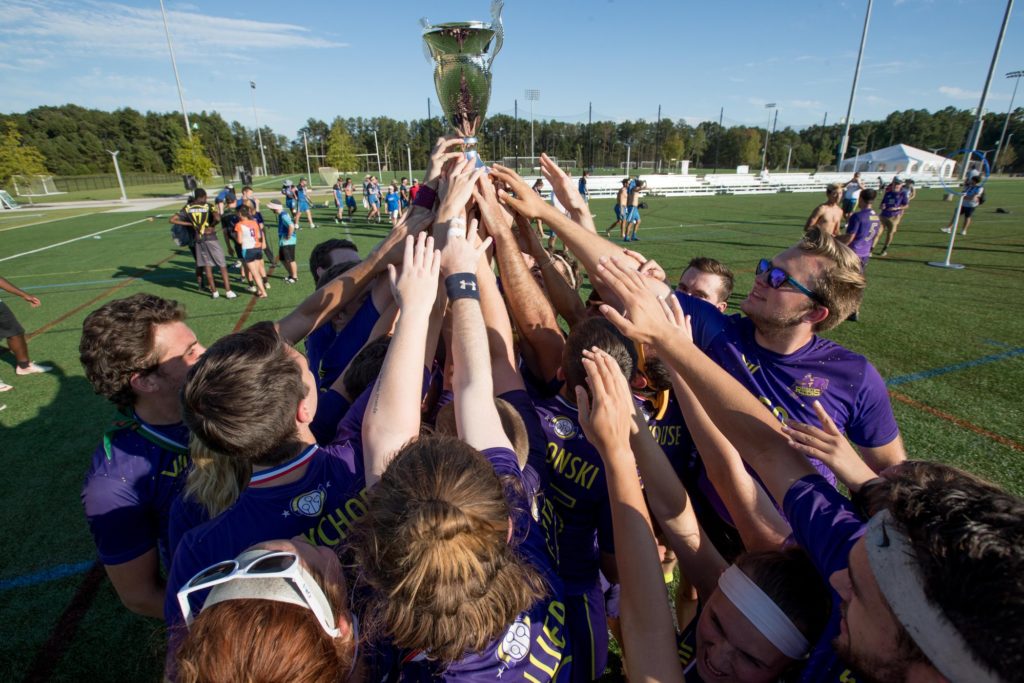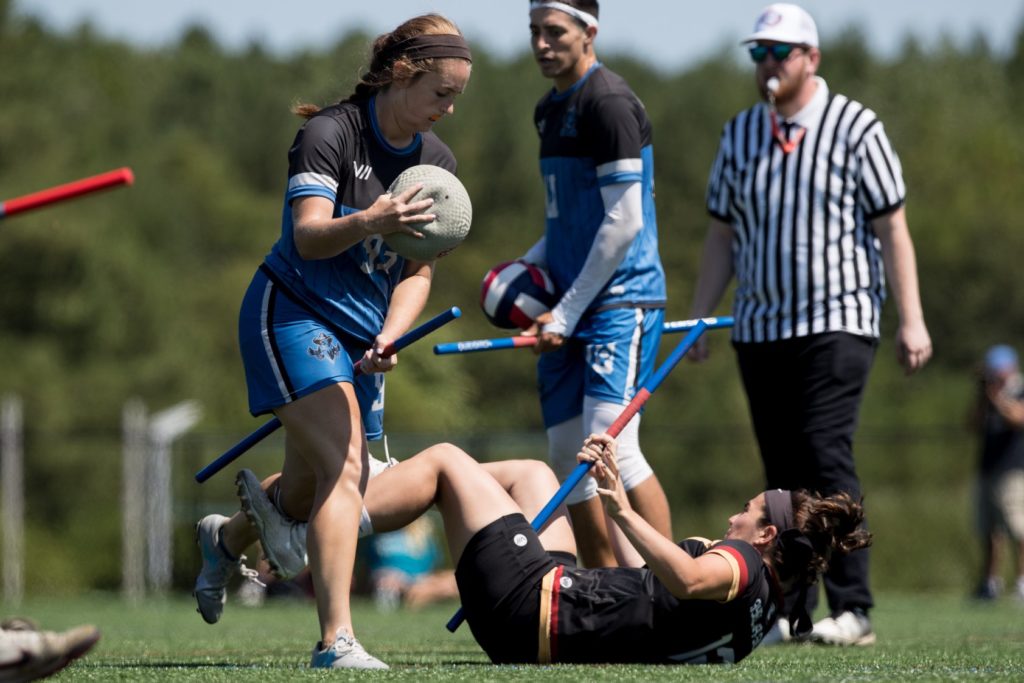Antwerp QC, Much of Belgian Core, Leaves Competitive Quidditch

Let’s not bury the lede. The 2019 MLQ Championship was Boston’s weekend. Specifically, it was Leeanne Dillmann and Mario Nasta’s weekend. At a tournament that brought together almost all of the best talent the sport has to offer, the pair’s dominance was unmatched by any of their competition.
Boston thrived in transition. While the team’s half-court offense left plenty to be desired, Boston was at its best when Jayke Archibald soared down the field to uncork a shot or a pass to an open Bryan Mulcahy, Justin Cole or East Division MVP Teddy Costa. But these opportunities only materialized because of the play of Dillmann and Nasta. The two dominated bludger control not just the entirety of their shifts in the finals, but all weekend. It would still be safe to estimate the pair hovered around 90-to-95 percent bludger control whenever on the field together during the tournament.
This is not to discredit the rest of the Boston beating core. Lulu Xu and Max Havlin are names of which nobody needs reminding, and the pair had a fairly dominant weekend themselves, posting standout performances up to the finals series. Jesse Knowlton and USNT Development Academy’s Serena Montiero, even with their limited minutes, were also able to, at minimum, create parity in the beater game.
But the distinct values of each of those three beater lines this weekend became clearly defined in the finals. While USNT’s Kylie McBride, who anchored a stout Austin Outlaws defense, was able to play Havlin and Xu as well as Montiero and Knowlton evenly–grinding the Night Riders’s transition game to a halt with the help of partners Tate Kay and Jack Wang–she was not able to find the same success versus Dillmann and Nasta.
The Night Riders were at their purest during the first game of the finals. Archibald and Costa’s quick and shifty defense–along with the physical and opportunistic point and wing defending from Mulcahy and Cole–was enough to slow down a well-regarded Austin attack and immediately pounce on turnovers created by the beaters. The Night Riders got into their transition game quickly and efficiently. They were flying. Boston was the better team.
The snitch grab by John Anderson felt vital for the Outlaws. It suddenly looked like Austin might just steal one: Not a sentence you expect to hear about the two-time defending champions. But once the snitch was caught and Nasta and Dillmann returned to the quaffle game, Boston was able to once again find the rhythm that created their lead in the first place, rallying back from the Austin grab to take game one.
If the first game was quintessential Night Riders gameplay, the second was a game of adjustments. With the long shifts Nasta and Dillmann had put in for game one, Boston instead turned to Havlin and Xu to start game two. Meanwhile, Austin made the necessary changes to counter Boston’s bludger dominance, keeping their bludgers all but on top of the center hoop on defense–“turtling”–to make sure the Night Riders never benefited from bludger control. Facing two bludgers on offense and with only one back on defense, Boston’s game began to grind to a halt.
When Austin forced Boston into half-court sets without bludger control, they were able to turn the screws thanks to the elite level play of Kaci Erwin and Kylie McBride anchoring the middle of the defense.
It is honestly hard to overstate just how good the two were on the weekend. Erwin’s point defending was near flawless, allowing the Outlaws to play bigger bodies at the hoops in their 2-2 hybrid zone. Meanwhile, McBride’s point-perfect positioning, along with a heavy dose of lateral quickness and spatial awareness, allowed her–with the help of Kay–to take complete control of the keeper zone line to the baseline. Make no mistake: Kay is one of the sport’s best beaters, but the jump-out-of-your seat moments that we’ve come to expect from him all exist because of McBride’s ability to award him that freedom.

Despite all of these built-in advantages for Austin, game two came down to adjustments. Austin did dominate the game for long stretches–bludger control and the Erwin-McBride-led defense made life difficult for the Night Riders–but the turtled bludgers exposed Austin in one crucial way: it allowed Boston to shoot.
And shoot Boston did. Long possessions with chaser movement that seemed to be leading to nowhere ended in goals because of the exceptional shooting ability of Archibald and Costa. The pair are noted marksmen–Archibald in particular–but even the best will have bad shooting days. Luckily for Boston, Sunday wasn’t one If them.The Night Riders’ shooting kept them in the game and put the ball back in the Outlaws’s court.
The game moved to the 20-minute timeout with Austin nursing just a 20-point lead. But it seemed like it may be enough, as the Outlaws two-male beater sets gave Boston fits all series in snitch-on-pitch scenarios. Cole Travis, Monroe, Kay and Wang were able to use an advantage in athleticism to win the kind of 50-50 balls that make or break the seeker game, but the team’s seekers could not deliver against snitch Cody Keefer.
The strategic fumbles we saw from the Outlaws to close out games one and two are a difficult pill to swallow, though understandable. There’s still a lot for coaches to figure out under the new rules, and neither team gets pushed the way they do when playing against each other. New situations create confusion, and the value of a non-playing coach becomes most clear during the most chaotic moments of the most important games. It’s hard not to wonder what former Austin coach Azeem Hussein could have offered in these moments. Could Monroe have moved to the quaffle game? Could the Outlaws have slowed the pace on a couple key possessions? Could the team have made more out of a late Archibald yellow card?
With the Night Riders’ star keeper watching from the penalty box and Austin just one goal away from a win, seeker Tyler Beckmann didn’t have much time. It’s a struggle to pinpoint how or why Beckmann had such a sterling performance this weekend. He’s gangly without being particularly long, he’s big without being particularly strong, he’s slim without being particularly fast. So why is he so good? Maybe no journalist or strategist could tell you, but he could.
“The snitches these days are so good,” Beckmann said in an interview after a semifinals catch. “They’re probably going to be bigger than you or faster than you, but you just need one moment. You just need to trick them for one moment, be faster or stronger than them for one moment. That’s what I try to do”.
Beckmann found his moment, and Boston found its title.
Archives by Month:
- May 2023
- April 2023
- April 2022
- January 2021
- October 2020
- September 2020
- July 2020
- May 2020
- April 2020
- March 2020
- February 2020
- January 2020
- December 2019
- November 2019
- October 2019
- August 2019
- April 2019
- March 2019
- February 2019
- January 2019
- November 2018
- October 2018
- September 2018
- August 2018
- July 2018
- June 2018
- April 2018
- March 2018
- February 2018
- January 2018
- November 2017
- October 2017
- July 2017
- June 2017
- May 2017
- April 2017
- March 2017
- February 2017
- January 2017
- December 2016
- November 2016
- October 2016
- September 2016
- August 2016
- July 2016
- June 2016
- May 2016
- April 2016
- March 2016
- February 2016
- January 2016
- December 2015
- November 2015
- October 2015
- September 2015
- August 2015
- July 2015
- June 2015
- May 2015
- April 2015
- March 2015
- February 2015
- January 2015
- December 2014
- November 2014
- October 2014
- September 2014
- August 2014
- July 2014
- May 2014
- April 2014
- March 2014
- February 2014
- January 2014
- November 2013
- October 2013
- September 2013
- August 2013
- July 2013
- June 2013
- May 2013
- April 2013
- March 2013
- February 2013
- January 2013
- December 2012
- November 2012
- October 2012
Archives by Subject:
- Categories
- Awards
- College/Community Split
- Column
- Community Teams
- Countdown to Columbia
- DIY
- Drills
- Elo Rankings
- Fantasy Fantasy Tournaments
- Game & Tournament Reports
- General
- History Of
- International
- IQA World Cup
- Major League Quidditch
- March Madness
- Matches of the Decade
- Monday Water Cooler
- News
- Positional Strategy
- Press Release
- Profiles
- Quidditch Australia
- Rankings Wrap-Up
- Referees
- Rock Hill Roll Call
- Rules and Policy
- Statistic
- Strategy
- Team Management
- Team USA
- The Pitch
- The Quidditch Lens
- Top 10 College
- Top 10 Community
- Top 20
- Uncategorized
- US Quarantine Cup
- US Quidditch Cup
